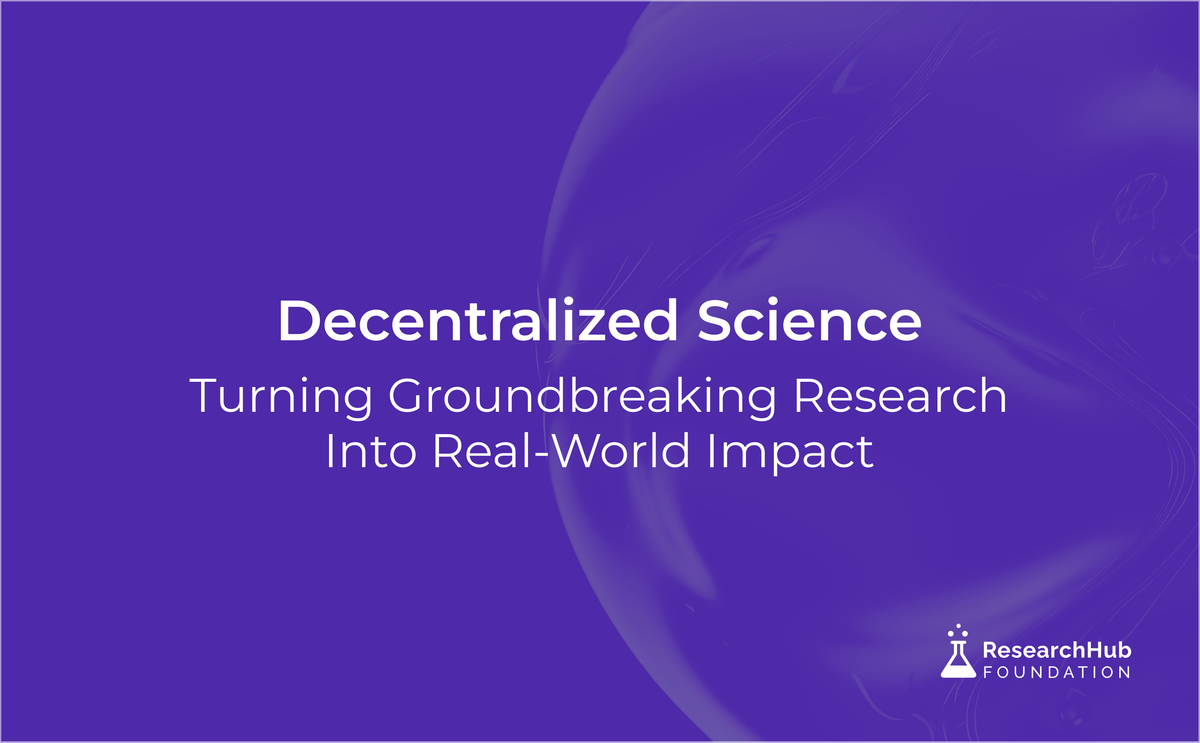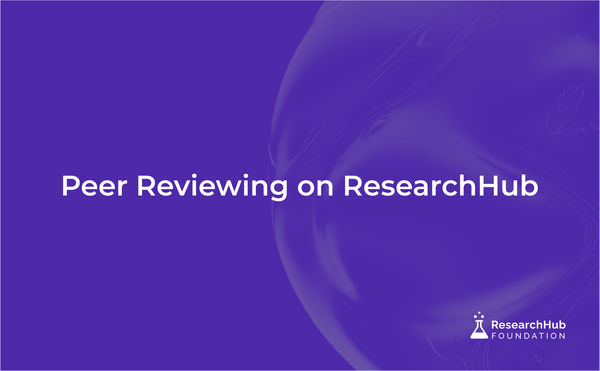Decentralized Science: The Key to Turning Groundbreaking Research into Real-World Impact

Despite billions of dollars being poured into scientific research each year, much of it never sees the light of day. Groundbreaking discoveries often remain buried in academic journals, accessible only to a small circle of scientists. Meanwhile, the world outside the lab struggles to benefit from these advancements, and industries, too often disconnected from cutting-edge science, churn out products that lack true innovation.
“Academia exists in a weird alternate reality where money and traditional market incentives don’t seem to matter.”
Brian Armstrong, CEO, Coinbase & ResearchHub
Academia operates in an alternate reality, where success is measured not by real-world impact, but by citations, tenure, and the opinions of peers. These skewed incentives mean that scientists can dedicate their careers to research that never moves beyond the pages of a journal.
This disconnect between scientific research and the marketplace has created a vacuum where innovation stagnates. But what if scientists could capture the financial upside of their work? What if research could be more aligned with market incentives, breaking free from the confines of academia’s outdated currency of citations? Decentralized Science (DeSci) is rewriting the rules and bridging the gap between discovery and real-world impact.
Section 1: Broken Incentives in Academia
Academia operates in an alternate economy where citations, tenure, and peer recognition hold more value than real-world impact. This misalignment with the marketplace has skewed incentives, causing researchers to prioritize publishing papers over creating practical solutions. As a result, academic success is measured by the number of publications, not the significance of the discoveries.
“Tenure, citations, and the opinion of your peers is what leads to grants, so instead this has become the currency of academia.” Brian Armstrong, CEO, Coinbase & ResearchHub
In academia, Goodhart’s Law has struck: "When a measure becomes a target, it ceases to be a good measure." Citations and publication counts have become the targets, diverting focus from genuine innovation. This focus on quantity over quality has also contributed to the reproducibility crisis—a significant portion of published research cannot be reliably replicated, undermining trust in scientific findings. Researchers often choose topics likely to get published rather than those that would drive progress in real-world applications. Worse still, negative findings—crucial in advancing scientific understanding—are rarely published because they don't generate citations or prestige. By reinforcing an alternate economy detached from the marketplace, the current incentive structure stifles innovation and delays the transition of scientific breakthroughs into solutions that could benefit society.
To truly unlock the potential of science, we need to reimagine how we reward research. Instead of celebrating academic prestige, we must realign incentives to value research that leads to real-world solutions and embraces both successes and failures.
The Disconnect Between Science and Market Incentives
One of the fundamental challenges in academia is its misalignment with real-world market incentives. Scientists often fail to capture the financial rewards from their discoveries, which may explain their focus on the alternative currency of citations. In contrast, ResearchHub aims to realign research outputs with quality by offering scientists both currency (ResearchCoin) and reputational rewards for demonstrating healthy research practices.
The complex process of licensing intellectual property (IP) presents a significant barrier to scientists benefiting financially from their inventions. Typically, when a university owns the IP, it is the institution—not the individual researcher—that reaps the majority of the financial rewards from commercialization. This structure can hinder innovation, as universities often prioritize maximizing royalties over accelerating the commercialization process. Simplifying the tech transfer and licensing procedures could help bridge the gap between research and market incentives, enabling scientists to capture more financial benefits and bringing new discoveries to market more efficiently.
Section 2: The Rise of DeSci: A New Paradigm for Science
DeSci (Decentralized Science) addresses the inefficiencies of traditional scientific research by bringing science onchain. Onchain refers to transactions or data recorded directly on a blockchain, where they are publicly visible, secure, and immutable, ensuring transparency and trust through decentralized validation by the blockchain network.
- Decentralized Funding: By tokenizing research projects and utilizing crowdfunding, DeSci platforms remove the need for traditional gatekeepers like central funding agencies. Researchers no longer have to rely solely on institutional backing; instead, they can bring their work onchain and tap into a global pool of supporters, ensuring that important, underfunded areas of science can thrive.
- Transparency and Accountability: With blockchain, all funding transactions are recorded onchain through smart contracts, ensuring complete transparency. Researchers receive funds based on real-time progress, with payments tied to specific milestones. This eliminates the delays of traditional funding approval processes and creates an accountable system where both funders and scientists can track how funds are used, all in real-time.
- Open Peer Review: ResearchHub brings peer review onchain, promoting an open and transparent review process. Unlike the traditional, often closed and unpaid system, ResearchHub compensates reviewers for their contributions and incentivizes high-quality reviews. This shift encourages a fairly compensated and efficient peer review process, where the work is visible to the community, and reviewers are rewarded for their expertise.
By bringing these key processes onchain, DeSci paves the way for a more transparent, accountable, and decentralized approach to scientific progress.
Section 3: How DeSci Solves the Problems
IP-NFTs Bring Intellectual Property Onchain
One of the most innovative solutions DeSci offers is the use of IP-NFTs (Intellectual Property Non-Fungible Tokens) to bring intellectual property onchain. These IP-NFTs enable decentralized ownership, where communities, investors, and even individual backers can co-own intellectual property and share in the potential upside of scientific discoveries. For researchers, this means the ability to tokenize their inventions or findings, creating a new mechanism to continuously access funding. Rather than relying solely on institutional grants or traditional funding streams, researchers can leverage IP-Tokens to attract a global pool of backers. Additionally, researchers can pay expert collaborators in tokens like ResearchCoin (RSC), enabling a flexible and dynamic research environment where collaboration is incentivized and talent is easily attracted. This model disrupts the traditional bottleneck in research funding and accelerates the pace at which discoveries can move from concept to commercialization.
The IP-NFT model, pioneered by Molecule, has opened the door for an entire ecosystem of decentralized science communities to participate in the funding, development, and commercialization of research. By allowing communities to invest and co-own research, IP-NFTs democratize the process of innovation, giving rise to new scientific opportunities that were previously inaccessible under the old system.
ResearchHub Empowering Researchers Through Decentralized Rewards and Crowdfunding
ResearchHub is a prime example of how DeSci platforms are changing the way scientific work is conducted and rewarded. Through cryptocurrency, ResearchHub allows scientists to earn ResearchCoin (RSC) for contributing to various aspects of the research process. Whether it's submitting new research or conducting peer reviews, scientists are compensated for their efforts, aligning their contributions with financial incentives. This model bypasses traditional systems that rely on unpaid peer reviews and merely reputational incentives empowering researchers to take ownership of their work while ensuring that quality contributions are financially rewarded. In essence, ResearchHub democratizes scientific collaboration and incentivizes meaningful participation. In addition to rewarding contributions, ResearchHub enables researchers to crowdfund their projects, helping them validate early ideas quickly. By shifting funding control from central authorities to the researchers themselves, the platform accelerates the process and puts scientists in control of the science.
One of ResearchHub’s standout features is its grant system, which directly aligns research with market incentives. Any user can sponsor a grant to incentivize researchers to answer a question, carry out a research task, or conduct a peer review. Companies like Hippocrat.io have leveraged this system to fund specific research that addresses their unique needs. By offering targeted grants, organizations can attract researchers to work on real-world problems, accelerating the development of solutions that bring measurable improvements to people's lives.
Section 3: The Future of Science: Why DeSci Matters
Breaking the Cycle of Broken Incentives
DeSci has the potential to significantly transform academia's outdated incentive structures by introducing systems that align more closely with market forces and real-world impact. Traditional academic rewards, such as tenure and citations, often shift researchers' attention away from reproducible work, as these incentives prioritize perceived novelty and eye-catching results over rigorous, reliable findings. By offering financial rewards directly tied to the quality and reproducibility of research, platforms like ResearchHub and Molecule foster a model where innovation and real-world outcomes take precedence. This shift could break the cycle of "publish or perish," replacing it with a system that fairly compensates meaningful and impactful contributions to science.
Empowering a New Generation of Researchers
DeSci opens doors for less senior and underrepresented scientists by providing them access to global collaboration and decentralized funding opportunities that were previously restricted to well-established institutions. Without the need for institutional prestige, early-career researchers and those from marginalized regions can now participate in the global research ecosystem. This democratization of funding and collaboration ensures that valuable ideas—regardless of the researcher's background—can receive the support they need to thrive. DeSci gives rise to a more inclusive scientific community, where innovation is driven by merit and global participation, not just by the privileged few.
Driving a New Scientific Revolution
DeSci has the potential to usher in a new era of scientific discovery—a "Second Scientific Revolution"—where breakthroughs happen faster, and science becomes more inclusive, transparent, and impactful. With decentralized platforms driving research funding, peer review, and intellectual property management, the scientific process can evolve beyond its current limitations. The vision for DeSci is a future where discoveries are shared openly, innovation is no longer stifled by outdated systems, and global collaboration leads to faster solutions to humanity's greatest challenges. By reimagining the structure of scientific research, DeSci could catalyze a revolution in knowledge, paving the way for unprecedented progress in the sciences.





